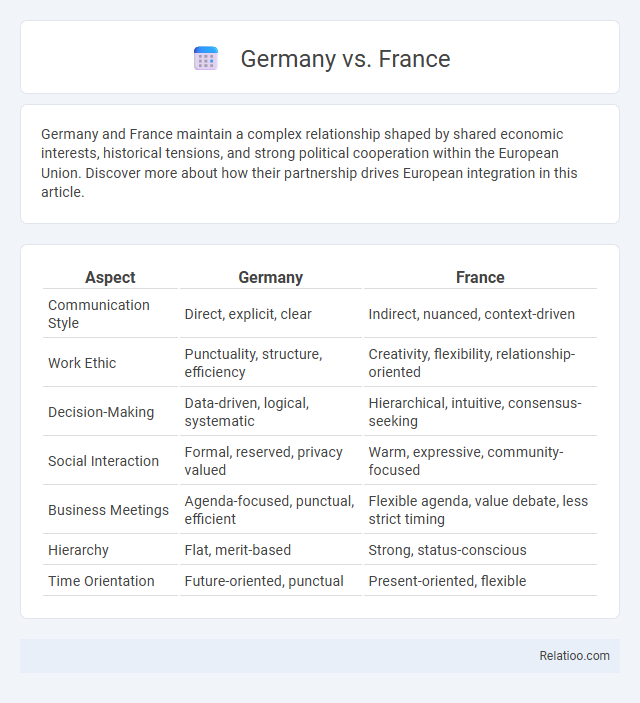Germany and France maintain a complex relationship shaped by shared economic interests, historical tensions, and strong political cooperation within the European Union. Discover more about how their partnership drives European integration in this article.
Table of Comparison
| Aspect | Germany | France |
|---|---|---|
| Communication Style | Direct, explicit, clear | Indirect, nuanced, context-driven |
| Work Ethic | Punctuality, structure, efficiency | Creativity, flexibility, relationship-oriented |
| Decision-Making | Data-driven, logical, systematic | Hierarchical, intuitive, consensus-seeking |
| Social Interaction | Formal, reserved, privacy valued | Warm, expressive, community-focused |
| Business Meetings | Agenda-focused, punctual, efficient | Flexible agenda, value debate, less strict timing |
| Hierarchy | Flat, merit-based | Strong, status-conscious |
| Time Orientation | Future-oriented, punctual | Present-oriented, flexible |
Historical Overview of Germany vs France Rivalry
The Germany vs France rivalry traces back to centuries of territorial disputes and wars, including the Franco-Prussian War (1870-1871) which culminated in German unification and the annexation of Alsace-Lorraine. The two World Wars intensified animosities, with post-World War II reconciliation efforts shaping modern diplomatic relations. Your understanding of these historical tensions offers insight into how apology rituals have been pivotal in addressing grievances and fostering forgiveness between these nations.
Political Relations Between Germany and France
Political relations between Germany and France have undergone significant evolution since World War II, focusing on reconciliation through diplomatic rituals that emphasize mutual apology and acknowledgment of past conflicts. The Elysee Treaty of 1963 symbolizes their commitment to peace, with state visits often featuring formal apology gestures that reinforce trust and cooperation. These ritualistic acknowledgments play a crucial role in strengthening the Franco-German alliance within the European Union framework.
Economic Comparisons: Germany vs France
Germany's economy is characterized by a robust industrial sector, with a GDP of approximately $4.5 trillion, making it the largest economy in Europe, while France's GDP stands around $3 trillion, reflecting a more diverse economy with significant contributions from services and agriculture. Germany's export-driven economy excels in automotive, machinery, and chemical products, leading to a trade surplus, whereas France focuses more on aerospace, luxury goods, and tourism, resulting in a relatively balanced trade balance. Both countries show differing labor market dynamics; Germany exhibits lower unemployment rates and higher labor productivity compared to France, influencing overall economic competitiveness within the EU.
Cultural Differences and Similarities
Germany's apology rituals emphasize directness and explicit verbal acknowledgment of wrongdoing, reflecting cultural values of honesty and responsibility, while France incorporates more formal expressions and subtle social cues within its apologies, showcasing a preference for maintaining harmony and face-saving. Both cultures value sincerity and reparative actions, but Germany tends to prioritize clarity and accountability, whereas France balances expression with social grace. These differences highlight broader cultural approaches to communication and conflict resolution.
Language and Communication Styles
Germany emphasizes direct and explicit communication in apology rituals, prioritizing clear responsibility acknowledgment and precise language to restore trust efficiently. France incorporates a blend of formal politeness and emotional expression, using carefully chosen phrases that balance sincerity with social grace. The contrast highlights Germany's preference for straightforwardness versus France's nuanced conversational style, reflecting deeper cultural values in repairing social harmony.
Key Events Shaping Germany-France Relations
The Germany-France relationship has been profoundly shaped by key events such as the Franco-Prussian War (1870-1871), which led to German unification and deep French resentment, and the reconciliation efforts symbolized by the Elysee Treaty of 1963 fostering bilateral cooperation. Post-World War II apologies and mutual acknowledgments, including Germany's expressions of remorse for Nazi aggression, have been crucial in healing historical wounds and building trust. Your understanding of these pivotal moments highlights how apology rituals contribute significantly to the ongoing diplomatic and cultural rapprochement between the two nations.
Military and Defense Cooperation
Germany and France maintain a robust military and defense cooperation through the Franco-German Brigade, a key element of the European defense framework promoting joint operations and interoperability. This collaboration emphasizes strategic alignment in NATO missions and the development of shared military technology and capabilities within the European Defence Agency. Apology rituals are less formalized in military contexts but play a role in fostering trust and reconciliation during joint exercises and multinational peacekeeping efforts.
Social Policies: Germany vs France
Germany emphasizes social welfare through comprehensive healthcare, unemployment benefits, and long-term care insurance, fostering a robust social safety net. France prioritizes universal healthcare, family allowances, and extensive labor protections, ensuring strong support for workers and families. Both countries implement distinct social policies reflecting their cultural values and historical contexts in promoting social solidarity.
Technology and Innovation Leadership
Germany excels in advanced manufacturing technologies and automotive innovation, driven by heavy investment in Industry 4.0 and AI integration. France leads in aerospace and nuclear technology, with a strong emphasis on sustainable energy solutions and quantum computing research. Both countries demonstrate distinctive cultural approaches to apology rituals, where German communication tends to be direct and formal, while French culture values expressive and nuanced apologies, reflecting their broader innovation leadership styles.
Future Prospects for Germany-France Relations
Germany and France are poised to deepen their diplomatic and economic collaboration, leveraging their shared commitment to European integration and innovation. Your opportunities lie in monitoring joint initiatives in technology, environmental policy, and defense, which aim to solidify long-term stability and prosperity in the region. As the two nations address past grievances through structured apology rituals, their reconciliation efforts enhance mutual trust and pave the way for a more unified future within the European Union.

Infographic: Germany vs France
 relatioo.com
relatioo.com